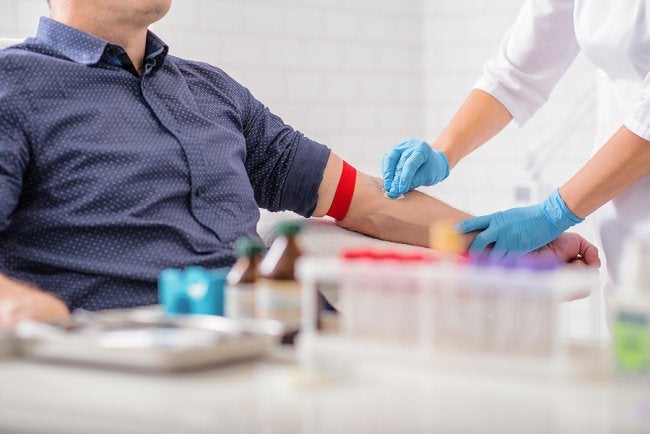-
Answering Common Questions About Hematuria

The presence of blood in one’s urine is known as hematuria. Hematuria isn’t a specific medical condition. Rather, it’s a sign of an underlying problem. Although hematuria may be attributed to a benign issue, it might sometimes be caused by a serious medical problem that requires treatment. This is why it’s important to see a urologist promptly, even if you only notice bloody urine once.
What is microscopic hematuria?
Patients who visit a urologist because of hematuria often noticed the visible blood in the urine, but bloody urine isn’t always detectable to the naked eye. Sometimes, the presence of blood in a urine sample is only discovered during other medical exams. When red blood cells in the urine cannot be visibly detected, it is referred to as microscopic hematuria.
Am I at risk of hematuria?
Anyone can experience hematuria, including pediatric patients. Your risk may be elevated if you are a man over the age of 50 or a woman with a urinary tract infection. A family history of kidney problems or a recent infection might also increase your risk. Long-distance runners and other athletes who engage in strenuous exercise may experience hematuria from time to time.
What underlying problems can cause hematuria?
There are many possible causes of hematuria, including relatively harmless issues like strenuous exercise and sexual activity. It may be attributed to a urinary tract infection (UTI), viral infection, or sexually transmitted disease (STD). In men, benign prostatic hyperplasia, also known as an enlarged prostate, can be the culprit. Some of the more serious causes of bloody urine include kidney, ureter, and bladder stones, kidney diseases, sickle cell anemia, and tumors of the bladder, kidneys, prostate, ureter, or urethra. Fortunately, urological cancers are not a common cause . Sometimes, no cause is found. This is known as idiopathic hematuria.
How is hematuria treated?
Your urologist will develop a treatment plan based on his or her findings. Since hematuria is the result of an underlying issue, the treatment will address the cause. If no cause is found, you may be referred for monitoring and follow-up testing.
You’ll find the answers to all of your questions at Urology Associates, P.C. Our urology specialists throughout Tennessee provide cutting-edge treatments for all sorts of urologic conditions—from kidney stones to kidney cancer and many more. Call us at (855) 901-1338 to request a confidential patient evaluation.
-
What Does It Mean to Have an Elevated PSA?

Prostate-specific antigen, or PSA, is a protein that is made by the prostate and present in your blood. Your primary care physician or urologist may perform a PSA test as a routine part of your preventative health care regime. Abnormal levels can indicate a health problem, such as prostate cancer.
If elevated PSA levels are detected during a blood test, your urologist may recommend further prostate cancer screening tests to determine if cancer could be the cause. It is important to note that elevated PSA levels do not necessarily mean that cancer is present, and normal PSA levels do not mean that no cancer exists. It is one tool in the cancer screening process that your urologist can use to detect the disease in early stages, when cancer treatment is most effective.
Your urologist at Urology Associates, P.C. will review all of your lab results with you, so you understand what things like elevated PSA levels mean for your overall health. To schedule an appointment for prostate cancer screenings in Tennessee , please call (888) 329-7700.
-
Get the Facts About Chronic Testicular Pain

Thousands of men visit a urologist because of testicular pain. In some cases, the pain is caused by a debilitating condition called chronic testicular pain, or CTP. CTP ranges from mild to severe and can interfere with every day activities. If you believe you could be suffering from CTP, your urologist can provide treatments to ease your symptoms and help you enjoy a better quality of life. Here is what you need to know about this painful condition.
CTP may be constant or intermittent.
The discomfort associated with CTP may be constant in some men, while others have pain that comes and goes. The distinguishing factor between CTP, and other types of testicular pain, is that CTP persists for three months or more. Some men may have a sudden onset of pain that is eventually diagnosed as CTP, while others have pain that develops gradually.
Symptoms of CTP can vary.
Some men with CTP have symptoms all the time, but other men only have discomfort during activities. The pain can feel like aching and pressure or burning and throbbing, and may also spread to the lower back and upper thighs. The pain can appear in one or both testicles and may switch from side to side. In some men, the pain is accompanied by swelling, fever, painful urination, painful intercourse or ejaculation, and bloody urine. Nausea and vomiting are also possible.
Several treatment options are available.
If you are diagnosed with CTP, the first thing your urologist will do is try to pinpoint the cause. Trauma, infections, hernias, cysts and torsion are all potential causes of CTP, though in some cases, the cause is unknown. If your urologist does find a cause, treating the underlying issue can often resolve the CTP. Medications and surgery may be necessary to treat CTP.
Visit Urology Associates, P.C. for diagnosis and treatment any time you experience testicular pain. Our doctors provide comprehensive care for CTP , sexual health issues including erectile dysfunction, and testicular cancer in Tennessee. To make your appointment, call (888) 329-7700.
-
What You Need to Know About Kidney Stones
Most people know kidney stones’ reputation for being painful, but what exactly are they, and how can your urologist treat them? Watch this video to find out.
Kidney stones occur when certain minerals build up in your urine and form clumps that then must be passed out of your body via your urinary tract. They can cause severe pain in the back and abdomen as they move around, particularly if they are large or have jagged edges. In some cases, kidney stone treatment may revolve around pain medication and drinking extra water, but for large stones, your urologist may recommend surgery or another method of breaking up the stone.
At Urology Associates, P.C. , our doctors offer care for kidney stones, UTIs, erectile dysfunction, and a long list of other conditions affecting the urinary system and sexual health. To make an appointment with a urologist in Tennessee, call (888) 329-7700.
-
Advice for Discussing Sexual Health Issues with Your Partner

If you or your partner is experiencing sexual health issues, such as erectile dysfunction or low libido, communication is an essential part of overcoming them. It’s not always easy to begin a conversation about sexual health, but it’s important for your relationship to have an open and ongoing dialogue with your partner about issues you may both be experiencing. These tips for discussing sexual health can help you start the conversation.
Pick the Right Time and Place
Because sexual health can be a sensitive topic, choose the time and place of your conversation wisely. Pick a time when you and your partner can sit together without distractions and aren’t rushed. Have your conversation in a private place, where both of you can feel comfortable talking about the issues openly and honestly. Avoid starting the conversation before work, when you have someplace to be, or otherwise have obligations that could interfere with your ability to talk for as long as you need to.
Be Direct
Be direct with your partner about your concerns about your sexual health and how it is or could affect your relationship. If you have been diagnosed with a problem by your urologist, it can helpful to explain your condition and even give your partner materials your doctor may have provided to help you understand it. If your partner is the one experiencing the issue, ask any questions you may have and offer to research the answers together. The more informed both of you are about the issues, the better equipped you will be to face them together.
Talk About Treatments
Help your partner understand the treatment options available for the sexual health issue you are experiencing, or ask questions about the treatments he or she is considering. In many cases, partner involvement in treatments can be helpful. In all cases, having the support of your partner when dealing with sexual health issues is important.
Your urologist at Urology Associates, P.C. can help you prepare for your conversation about sexual health by equipping you with the information you need. If you are experiencing sexual dysfunction in Tennessee, make an appointment with a urologist today by calling (888) 329-7700.
-
When to See a Urologist About Premature Ejaculation

At least one in three men will experience premature ejaculation at some point in their lives, and when it is an infrequent issue, then it is not typically cause for concern. However, there are instances in which you should consider talking to a urologist about premature ejaculation, to improve your sexual health and ensure that no underlying health issues are contributing to the problem.
Talk to a urologist about premature ejaculation if you almost always ejaculate within one minute of beginning intercourse or if you are almost always unable to delay ejaculation when you want to. Even if premature ejaculation doesn’t happen often to you, talk to a urologist if you avoid intimacy because of your concerns about ejaculating prematurely.
Urology Associates, PC, and our Men’s Health Clinic provide men with comprehensive sexual health services for concerns such as premature ejaculation and erectile dysfunction. To make an appointment to talk to a urologist about sexual dysfunction in Nashville , please call (855) 901-1338.
-
Treatment Options for Women with Incontinence

Urinary incontinence can cause an enormous amount of anxiety for women, but if it is happening to you, you should know that you are not alone. Incontinence impacts the lives of millions of women of all ages in the U.S. Up to 80% of the 25 million people who live with urinary incontinence are women. The good news for women with incontinence is that you don’t have to suffer in silence. Multiple treatment options are available to control your symptoms and let you approach life with confidence again. Help starts with a visit to your urologist, who may recommend one of these treatments for your incontinence symptoms.
Behavioral Training
In some cases, incontinence symptoms can be overcome with behavioral training, such as bladder training. Bladder training involves scheduling visits to the bathroom and gradually increasing the time between visits, delaying urination for a set period of time when the urge strikes, and doing Kegel exercises to give you better control of the pelvic muscles that stop the flow of urine. Some women find that these exercises help them get adequate control of their symptoms without further treatment.
Medications
When behavioral training is not sufficient, your urologist may recommend medications. There are a number of different medications that can help with incontinence. The one your doctor selects for you depends on a number of different factors, including the type of incontinence you have. For instance, estrogen creams can help with stress incontinence, while Botox can be used to treat urge incontinence. Medications can be used alone or in conjunction with behavioral training.
Lifestyle Modifications
Alongside other treatments, your doctor may recommend some lifestyle changes that could help control your incontinence. Avoiding overconsumption of fluids, wearing a tampon when you jog or dance to put pressure on your urethra to reduce leaks, and avoiding alcohol and caffeine can all be helpful.
Don’t let incontinence impact your life for another day. At Urology Associates, PC, we can help you control your incontinence symptoms and get back to enjoying the activities you love. Make an appointment with a urologist in Tennessee today by calling (855) 901-1338.
-
Taking a Closer Look at Prostatitis

Prostatitis refers to inflammation or infection of the prostate gland, and it is the most common prostate condition in men over 50. There are four main types of the condition, and each requires care by a urologist . If you have been diagnosed with prostatitis or believe you could have the condition, here is what you need to know.
What are the types of prostatitis?
The most common type of prostatitis is chronic pelvic pain syndrome, or CPPS, which represents about 90% of prostatitis cases. CPPS causes painful ejaculation, pelvic pain, and rectal pain. A second type, asymptomatic inflammatory prostatitis, does not cause any symptoms and is only diagnosed when your urologist is examining the semen looking for another prostate condition. Acute bacterial prostatitis is an easy-to-treat infection, but it occurs rarely. It causes a sudden onset of pelvic pain, burning during urination, inability to empty the bladder, and fever. The fourth type, chronic bacterial prostatitis, is also rare. It causes symptoms similar to acute bacterial prostatitis but less severe and longer lasting.
What are the causes?
There are several different potential causes of prostatitis. Acute and chronic prostatitis occurs when bacteria from urine backs up into the prostate, usually as the result of a bladder infection, recent catheterization, or injury to the prostate. Other forms of prostatitis can be caused by infections, STDs, pelvic muscle spasms, or doing physical activity while your bladder is full.
How is prostatitis treated?
Treatment for prostatitis depends on the type. Prostatitis caused by bacterial infections can be treated with antibiotics. In some cases, it may be necessary to take the medication for several months. CPPS can be more challenging to treat. Your urologist may try multiple treatments, including muscle relaxants, and alpha blockers. Warm baths, physical therapy, and dietary changes, including avoiding spicy or acidic foods, may also help.
If you are experiencing the symptoms of prostatitis or another urological condition, make an appointment with Urology Associates, PC. We provide comprehensive urology services, from erectile dysfunction care to treatment for incontinence in Tennessee. For more information or to schedule a consultation, please call (855) 901-1338.
-
Recovering From a Vasectomy

Vasectomy is a fairly minor procedure that men can have as a form of permanent birth control. During this procedure, the vas deferens is sealed so that sperm will no longer be present in your semen. The recovery time for vasectomy is short, but there are certain steps you can take to ensure that everything goes well.
Support and Treatment
Your doctor will give you specific instructions for recovery, but there are some general tips to follow. It is normal to have some bruising, swelling, and pain, but if these symptoms worsen or don’t get better after a few days, be sure to call your doctor. For the first 48 hours after surgery, support your scrotum with a bandage and tightfitting underwear. Apply ice packs to the area for the first two days.
Limit Physical Activity
Following vasectomy, you will need to rest completely for at least 24 hours. After two to three days you can do light activity if you feel well enough, but you need to avoid sports and heavy lifting for at least a week. It is also important to abstain from sexual activity for at least a week, as ejaculation can cause pain and bleeding. When you do resume sexual intercourse, be sure to use another form of birth control until a doctor confirms that there is no sperm in your semen.
If you are considering vasectomy or any other urological procedure, our highly skilled team at Urology Associates, P.C. can provide you with any information you need. Visit us online or call to schedule an appointment at (877) 317-8639. We provide excellent urologic care to both men and women in the Nashville area.
-
What Are the Symptoms of Overactive Bladder?

Overactive bladder—sometimes called OAB—is a common condition that causes the overwhelming need to urinate and the inability to stop the flow of urine. The intrusive condition can be controlled with the help of your urologist, so see your doctor if it happens to you.
There are four symptoms of OAB. One is urgency, or the need to urinate right away with little ability to control it. Frequency is another symptom. People with OAB urinate more than eight times per day, rather than the typical four to six times per day. Urge incontinence, the loss of urinary control after experiencing an urge, is also a symptom, as is nocturia, or waking two or more times per night to urinate.
You don’t have to live with the stress and embarrassment of OAB. Make an appointment at Urology Associates, P.C. We provide comprehensive urology and sexual health care, from UTIs to ED and bladder cancer. Make an appointment with a urologist in Tennessee today by calling (855) 901-1338.
Recent Posts
categories
- Uncategorized
- Bladder Cancer
- Women's Sexual Health
- MonaLisa Touch
- Urology
- Urologist
- Erectile Dysfunction
- Kidney Cancer
- Incontinence
- Prostate
- MonaLisa Touch Laser Treatment
- Kidney Stones
- Urinary Tract Infections
- Event
- Sexual Dysfunction
- Testicular Cancer
- Prostate Cancer
- Urology Surgery Center
- urinary incontinence
- vaginismus
- noncoital pain disorder
- Hypoactive Sexual Desire Disorder
- Infographic
- provenge
- Xofigo
- robotic surgery
- hormone replacement
- diabetes
- renal cell carcinoma
- pelvic pain
- hematuria
- sexual health
- chronic testicular pain
- premature ejaculation
- Men's Health Clinic
- Dr. Melvin Seard
- Interstitial Cystitis
- vasectomy
- overactive bladder
- vaginal atrophy
- nocturia
- bladder infections
- urethral strictures
- Acute Epididymitis
- low sex drive
- circumcision
- pelvic floor dysfunction
- Peyronie's Disease
- prostatitis
- female sexual dysfunction
- varicocele
- difficult urination
- low libido
- PSA levels
- male fertility
- penile prosthesis
- prostatic intraepithelial neoplasia
- male infertility
- estrogen levels
- nurse navigator
- stress urinary incontinence
- vaginal yeast infection
- elevated psa
- painful sex
- adult circumcision
- epididymitis
- OAB
- kidney infection
- penile cancer
- pelvic organ prolapse
- Vasectomy Reversal
- bone health
- cystectomies
- clinical trials
- bloody urine
- Advanced Therapeutic Center
- WISH MedSpa
- neurogenic bladder
- WISH Team
- prostate biopsies
- BPH
- fecal incontinence
- lithotripsy
- osteoporosis
- kidney cysts
